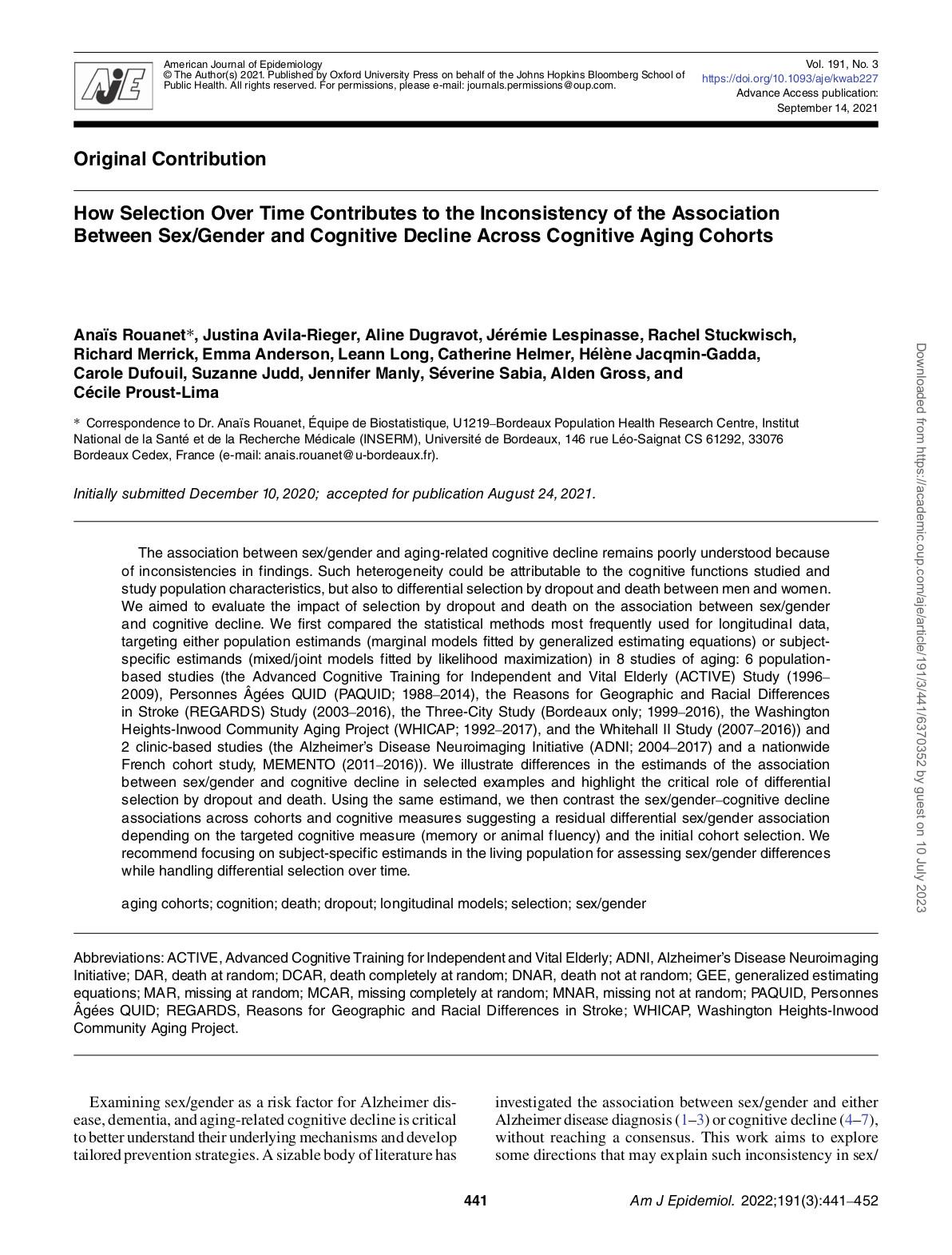A publication on the association between Sex/Gender and Cognitive Decline won the 2023 Publication of the Year Award
Retour
A publication on the association between Sex/Gender and Cognitive Decline
won the 2023 Publication of the Year Award
On behalf of the International Society to Advance Alzheimer’s Research and Treatment Design and Data Analytics PIA, the publication titled ‘How Selection Over Time Contributes to the Inconsistency of the Association Between Sex/Gender and Cognitive Decline Across Cognitive Aging Cohorts’ published in the American Journal of Epidemiology has been selected as the recipient of the 2023 Publication of the Year Award.
This disparity may be explained by the diversity of cognitive functions studied and the characteristics of the populations studied, but also by differential selection between men and women due to study exit and death.
The present study, initiated during the 2018 annual meeting of MELODEM (MEthods in LOngitudinal DEMentia research) initiative, aimed to assess the impact of selection by exit and death on the association between sex/gender and cognitive decline.
We illustrate the differences between estimators of the association between sex/gender and cognitive decline using selected examples and highlight the crucial role of differential selection by study exit and death.
Using the same estimator, we then contrast the associations between sex/gender and cognitive decline across cohorts and cognitive measures, suggesting a residual differential association between sex/gender as a function of the targeted cognitive measure (memory or animal fluency) and initial cohort selection.
We recommend targeting subject-specific estimators in the living population to assess sex/gender differences while accounting for differential selection over time.
Link to publication
https://academic.oup.com/aje/article/191/3/441/6370352
References
1. Jobe JB, Smith DM, Ball K, et al. ACTIVE: a cognitive intervention trial to promote independence in older adults. Control Clin Trials. 2001; 22(4):453–479.
2. Letenneur L, Commenges D, Dartigues J-F, et al. Incidence of dementia and Alzheimer’s disease in elderly community residents of south-western France. Int J Epidemiol. 1994; 23(6):1256–1261
3. Howard VJ, Cushman M, Pulley LV, et al. The Reasons for Geographic and Racial Differences in Stroke Study: objectives and design. Neuroepidemiology. 2005;25(3): 135–143.
4. Study Group. Vascular factors and risk of dementia: design of the Three-City Study and baseline characteristics of the study population. Neuroepidemiology. 2003;22(6):316–325.
5. Tang M-X, Cross P, Andrews H, et al. Incidence of AD in African-Americans, Caribbean Hispanics, and Caucasians in northern Manhattan. Neurology. 2001;56(1):49–56.
6. Marmot MG, Smith GD, Stansfeld S, et al. Health inequalities among British civil servants: the Whitehall II Study. Lancet. 1991;337(8754):1387–1393.
7. Mueller SG, Weiner MW, Thal LJ, et al. Ways toward an early diagnosis in Alzheimer’s disease: the Alzheimer’s Disease Neuroimaging Initiative (ADNI). Alzheimers Dement. 2005;1(1):55–66.
8. Dufouil C, Dubois B, Vellas B, et al. Cognitive and imaging markers in non-demented subjects attending a memory clinic: study design and baseline findings of the MEMENTO cohort. Alzheimer’s Res Ther. 2017;9(1):67.
Contact
Anais Rouanet anais.rouanet@u-bordeaux.fr
Cecile Proust-Lima cecile.proust-lima@u-bordeaux.fr



